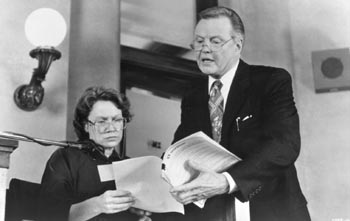
Phillip V. Caruso
Document Drama: Hammy villain Leo F. Drummond (Jon Voight) pores over pages of evidence with a bespectacled witness (Mary Kay Place) in 'John Grisham's 'The Rainmaker.'
A bland hero dampens 'Rainmaker'
FRANCIS FORD COPPOLA'S masterpiece, The Godfather, was, among other things, a study of moral shadings. Coppola's newest, John Grisham's The Rainmaker, is almost all black and white, with the whitest patch being the white knight Rudy Baylor (Matt Damon). He's the poor but honest Memphis lawyer who takes on a school of legal sharks in a suit against an insurance company whose dithering cheated a leukemia patient out of his bone-marrow transplant. Meanwhile, Baylor also goes on spec to help a beaten-up wife, Kelly (Claire Danes).
The city of Memphis seems to perk up Coppola; there are new surfaces for him to explore. And the movie is often engrossing for its supporting roles, a couple of which are surprise cameos. Among the familiar faces: Virginia Madsen, Mary Kay Place, Danny Glover and Mickey Rourke as a corrupt lawyer nicknamed "Bruiser." Jon Voight displays rich, almost Shatnerian hamminess as the villain. Still, the film is really carried on the diminutive shoulders of Danny DeVito, who plays the gregarious would-be lawyer Deck Shifflet, who saves Rudy's bacon again and again. He's a sort of mascot, a magic dwarf, and he turns out to be the smartest and funniest character in the movie. Listening to DeVito's growling, hard accents on words like "spouse" and "IRS," you suspect Shifflet got into the law for the pleasure of the fight instead of for the satisfaction of wearing a halo.
Damon's Rudy is the sort of character who would weigh the morality of jaywalking. Is this the reason the romance with Danes' character is so low-key--has it been smoothed over because of potential audience unease about the ethics of a man being both lawyer and lover? Kelly belongs to Rudy by right of combat, anyway; he gets into a fight scene over her in which baseball bats, torn-off kitchen cabinets and even refrigerators are weapons. Although she causes this preposterous battle, Kelly is a bungee character: she plummets in for a scene, and then she's yanked back again.
Rudy's the ostensible hero, but his part is underwritten. You might suppose that the sometimes redundant narration by Michael Herr was added later in the game, when it was realized that Damon couldn't emote about things his character couldn't witness. (Herr's narration is the second intrusion on the soundtrack, after Elmer Bernstein's exhausting score, which includes everything but the slide whistles in the slapstick comedy moments and trumpets in the moments of triumph.)
The film's ending is preserved from Grisham's book. Essentially, Rudy proves to be too clean for the legal profession. The renunciation sums up Coppola's problem: the bland hero is less interesting than the characters around him. Rudy's goodness--he's a lawyer stung by lawyer jokes--are a throwback to the days of the ladies' matinee and old-fashioned virtues. Damon's Rudy is all the paler when opposed to Deck and his almost malicious appetite for a legal brawl. During the scenes without DeVito or the supporting cast, I was impatient with the movie's prodigious length and WASP high-mindedness. The Rainmaker is an apt title for a sometimes damp film.
John Grisham's The Rainmaker (PG-13; 134 min.), directed by Francis Ford Coppola, written by Michael Herr and Coppola, based on the novel by John Grisham, photographed by John Toll and starring Matt Damon, Danny DeVito and Jon Voight.
[ Metro | Metroactive Central | Archives ]
![[Metroactive Movies]](/movies/gifs/movies468.gif)